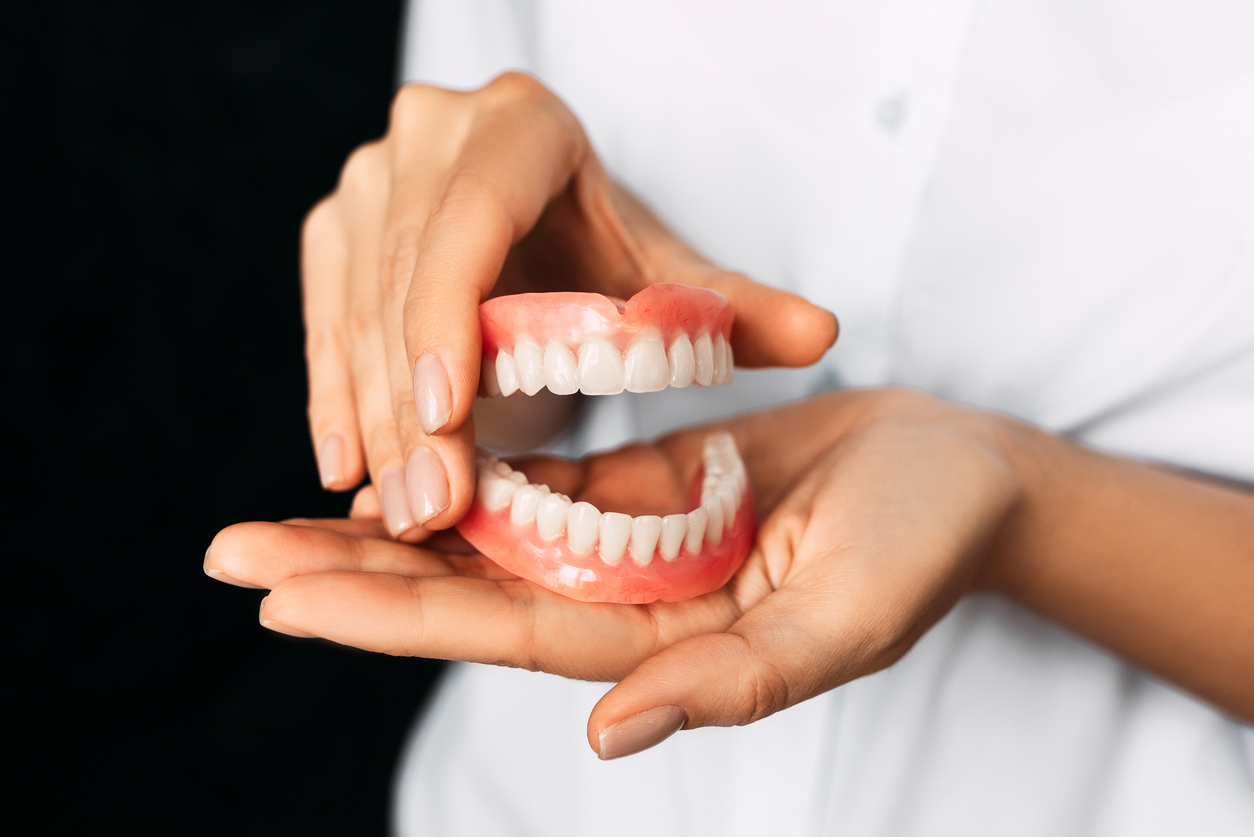How Long Do Dentures Last?

Dentures are a common solution for replacing missing teeth, providing functionality, and enhancing aesthetics and the patient’s confidence. With many different types and materials available for modern dentures, learning about their lifespan can be a great way to guide your denture decision. So, in this article, we’ll learn about how long dentures last, the factors that influence their longevity and provide tips to help you extend it.
Factors Affecting the Lifespan of Dentures
The longevity of dentures significantly depends on the materials from which they’re made. Dentures can be crafted from various materials, including acrylic resin, nylon and metal. High-quality materials are important for dentures because they endure the daily stresses of chewing and exposure to food and beverages. Chrome dentures, for example, tend to wear less quickly than acrylic and can offer a more natural appearance – contributing to their durability and functionality.
Fit and Comfort
The fit of the denture is another key factor. A well-fitted denture will distribute the stress of biting and chewing evenly, which helps prevent premature wear. Conversely, an ill-fitting denture can cause uneven pressure, leading to cracks, breakage, and discomfort. Semi-regular adjustments by a dental professional can be necessary to maintain a good fit, especially since the jaw and gums can change shape over time.
Patient’s Oral Health
The condition of your oral health plays a significant role in the life of your dentures. Good oral hygiene practices, such as regular brushing of the gums, tongue, and roof of the mouth, are essential to prevent infections that can adversely affect the dentures. Additionally, keeping the dentures clean prevents the buildup of stains and plaque, which can also degrade the materials over time.
How Long Should Good Quality Dentures Last?
Quality dentures, if well-maintained, can last for several decades. The average lifespan of a well-cared-for denture is about 5 to 10 years, but many can last much longer with minimal changes in the mouth’s structure and diligent care.
It’s important to recognise when it’s time to replace your dentures. Signs that you might need new dentures include noticeable wear and tear, cracks or chips, discomfort or poor fit, and difficulty chewing or speaking. Changes in facial appearance, such as sagging facial muscles, can also indicate that dentures need to be replaced.
Impact of Changes in Mouth/Jaw/Bone Structure
As we age, natural changes in the mouth and jaw structure occur, often leading to what is known as bone resorption, where the jaw bone loses its density. This process can alter the fit of dentures since they’re moulded to match the jaw’s original shape. Regular dental check-ups can help manage these changes, but over time, new dentures may be required to match the new contours of the mouth and ensure comfort and functionality.
Health Conditions and Lifestyle Factors
Certain health conditions like osteoporosis and gum disease can accelerate changes in the jaw and gums, affecting denture fit and function. Lifestyle factors, such as smoking, can also have detrimental effects, leading to faster deterioration of the gum tissues and affecting the bone structure that supports dentures.
Top Tips for Prolonging the Lifespan of Your Dentures
Maintaining daily cleaning routines will help with prolonging the life of your dentures. This includes brushing them daily with a soft-bristled brush and non-abrasive cleaner, soaking them overnight in a denture cleaning solution or water to remove stains and bacteria, and ensuring they’re thoroughly rinsed before being placed back in the mouth.
Regular visits to the dentist are also important for maintaining both oral health and the condition of dentures. These check-ups allow for adjustments to be made to the dentures as needed and for professional cleaning, which can help extend their lifespan.
Handling and Storage
Handling dentures with care can help prevent accidental drops that would cause them to break. When not in use, dentures should be stored in water or a denture solution to keep them moist, which prevents them from drying out and becoming brittle.By understanding the factors that affect the lifespan of dentures and following these care tips, users can enjoy a functional and aesthetic dental solution for many years. If you have any issues with your dentures or require a new set, please book a consultation with our team at Denturly today.
View our denture clinics
Find a Denturly clinic near you. We are always expanding our nationwide network of clinics to make our service more accessible.